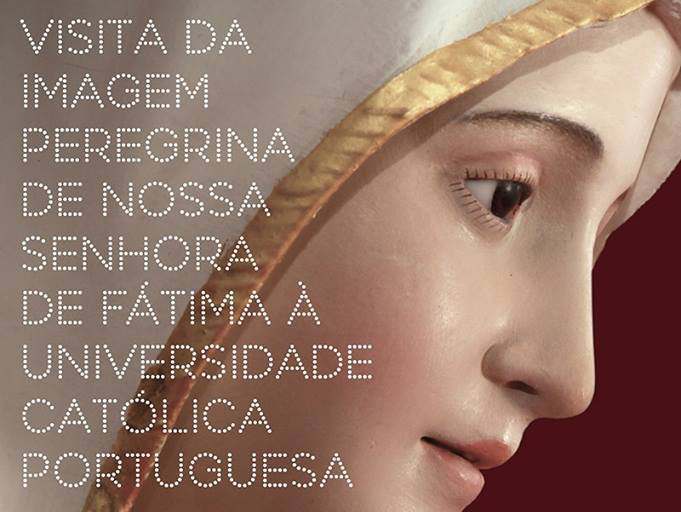
Bishop António Marto: the message of Fatima is "after the Scriptures" the "strongest and more impressive [complaint] of sin in the world”
The Bishop of Leiria-Fatima gives a Lectio Magistralis in the commemorative academic session of the National Catholic University of Portugal Day about the message of Fatima.
The message of Fatima is "after the Scriptures" the "strongest and more impressive complaint of sin in the world” which call the whole Church and the whole world for a serious examination of conscience," said this afternoon the Bishop of Leiria-Fatima at the Lectio Magistralis he gave for the academic session which took place in the Auditorium Cardeal Medeiros, in the context of the celebrations of the National Day of the Catholic University of Portugal, this year entitled "Cultivate the Ecology of Knowledge."
Entitled "Fatima, message of mercy and hope for the world," the prelate’s Lectio Magistralis underlines the importance and the topicality of the Fatima message, especially in the light of the current world.
"Fatima is in fact a phenomenon and an event that unveils and unrolls itself throughout history; it became an unavoidable reference and irradiation point for the history of the Church and of humanity" says Bishop of Leiria-Fátima.
"What impresses and amazes is that the context and content of the message are not restricted to a single path of personal faith of the little seers, to a particular situation of their country or to some truth of the faith in question," he said.
"Its horizon has an historical and worldwide reach: it is found in the center of worldwide concerns and the most tragic historical events of the twentieth century. Perhaps only now, a century later, we are able to understand more deeply the truth and the full reach of this message“, he added.
Bishop António Marto highlighted the modernity of this message of Fatima in front of the academic community at the Catholic University of Portugal, on the day that the Pilgrim Virgin statue visits the institution, as part of the visit to the diocese of Lisbon.
He made reference to its context, particularly to the two major conflicts that have marked the history of the twentieth century: the first and the second world war; totalitarianism regime such as Stalinism and Nazism; "the systematic lye" to rewrite history; a program to the denial of God; the annihilation and death of human beings and the total disregard for human dignity, the significant number of millions of victims on behalf of the radical purity of ideology, revolution or race, elevated to the status of new gods; the “new war” which would be called the "total war" or the collective phenomenon of hatred and violence that has seized persons and peoples. Situations that create, "in an evil concentration, a real symbol of the globalization of sin for the first time experienced in its monstrosity, in its horror and terror on a planetary level"; the greatest expressions of this are the acceptance of normality and "banality of evil".
For the Bishop of Leiria-Fatima, the message of Fatima includes "clearly and bitterly this tumultuous and dramatic historical vicissitude" and "only those who have a strong sense of man dignity before God, of their eternal destiny, can understand how big the tragedy of sin is and how the loss of the sense of sin is, in its deepest way, a loss of sense of all that is truly human.”
Facing this situation of a "wounded humanity", the message of Fatima is "the spokesperson of the clamor of the victims" and becomes an "invitation to read the story beginning with the victims, an invitation to focus around the mystery of the man before mystery of God", said Mgr. Antonio Marto.
For the Bishop of Leiria-Fatima, "the singular coincidence in time of these apparitions with historical moments of extreme gravity" is "a sign from God to our generation, a prophetic word for our time, a divine intervention in human history through the maternal face of Mary, a light on the history of the world.”
"The message of Fatima is a very serious warning and, at the same time, a consolation of theological hope: evil is defeated by the Trinitarian love revealed in the cross and resurrection of Jesus, by the love of Mary for us and our conversion," says the prelate.
In this perspective, the message of Our Lady "is a call to open ourselves to another dimension of history, nourished by another Presence, sustained by another Force, guided by another Light, focused on another Objective, mysteriously and silently present and operating in the succession of the generations who keep the Lord's promises and transmitted them from generation to generation", he adds.
The core of the message is therefore, in this "urgent invitation, bringing [us] back to the center of Christian life and of the world the adoration of God, the Lord of history, to the recognition of his primacy, to the execution to his salvific will, to the lighting of the desire to love God and to the encouragement to practice reparative love. Everything else has here its center of unity and irradiation.
Like the little shepherds who “are called from the periphery to get involved in history to the benefit of peace, with another force, another power, other means, apparently useless and ineffective to human eyes: the power of the prayer of the just man said with fervor, the perseverance in prayer for the gift of peace through adoration, through the devotion of reparation, through conversion and self-sacrifice according to the religious tradition of the time ", the Christians are called as well to get involved, aware that" the Immaculate Heart of Mary will triumph and a time of peace will be given to the world. "
The Day of the Catholic University of Portugal is celebrated on Sunday 7, February, but the academic session took place this Friday afternoon in Lisbon.
CR
|
